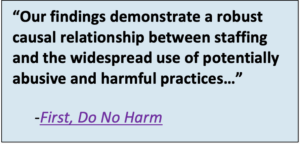The Senior Care Policy Briefing covers important long-term care issues by highlighting policy updates, news reports, and academic research.
Read the full Senior Care Policy Briefing below or download here.
July 31, 2025.
NEWSFLASH
- A new study from Private Equity Stakeholder Project finds that private equity investment in private duty nursing (PDN), a service many families rely on for medically fragile adults at home, often results in higher costs for taxpayers and worse outcomes for consumers, according to McKnight’s.
- PDN, typically covered by Medicaid, provides around-the-clock care for individuals with complex medical needs. The study highlights how private equity-owned PDN companies tend to prioritize cost-cutting and rapid expansion, leading to lower caregiver wages and high staff turnover.
- Genesis HealthCare has filed for bankruptcy, raising alarms about the risks of private equity ownership in long-term care.
- Genesis, one of the largest nursing home chains in the U.S., underwent years of restructuring and ownership changes, and now the company’s collapse comes after extensive real estate spin-offs and debt accumulation, according to Skilled Nursing News. These financial moves drain resources from resident care, leaving facilities understaffed and vulnerable.
- The Ensign Group, a rapidly expanding for-profit nursing home chain, is projected to hit $5 billion in annual revenue for the first time this year.
- According to a recent investor call, company executives say 2025 has been a “blockbuster year,” fueled by the purchase of dozens of new nursing homes and a strong position in the wake of the bankruptcy by Genesis.
- As nursing home chains like Ensign continue to grow, stronger ownership disclosure, regulatory oversight, and consumer protections are urgently needed to ensure that resident needs are not sacrificed to maximize profits.
While analysts view The Ensign Group as a strong financial performer, these ratings focus on investor returns, not resident outcomes. Corporate success in long-term care is too often built on models that prioritize profit over residents’ well-being.
UNDERSTAFFED AND UNSAFE
- A new study explores how chronic understaffing in U.S. nursing homes may not only reduce care quality but also incentivize unethical practices, particularly the inappropriate use of antipsychotic medications as chemical restraints for individuals living with dementia. Using nationwide data, the researchers find that increasing nurse staffing by just 15 minutes per resident per day leads to a 1.54% reduction in antipsychotic use.
- The study reveals that these risks are particularly serious in for-profit facilities and in nursing homes with persistent staffing shortfalls.
- The message is clear: Chronic understaffing isn’t just a quality issue; it’s a safety crisis. Families, residents, and advocates must continue to demand better.


